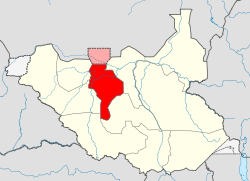Gogrial state in internal conflict over cabinet and top legislative appointments
March 2, 2016 (JUBA) – Politicians, community leaders and local youth leaderships in the newly created Gogrial state, which has been curved from former Warrap state, are sharply divided over the manner in which the newly appointed governor, Abraham Gum, has appointed state ministers and parliamentary leadership, with some calling for his removal before completing formation of the state government.

While some of them have called for dismissal of the governor in case he does not review his appointments and selections of leaders, others have defended his action, saying the appointed illiterate officials are equally qualified based on their loyalty and past contributions in the war as liberators.
“This governor must go. He started on a wrong footing. Look at the way he bulldozed the appointment of the speaker. He ordered the selection of a completely illiterate person to be the speaker. And as this was not enough, he again appointed another illiterate person as the minister of information. Which language will these people be using to communicate with people who do not speak Dinka [language] and they need to talk to the state government,” an official from Gogrial Kuac South county told Sudan Tribune in an exclusive interview on Wednesday.
He said even a member of parliament, let alone the speaker, must be someone who knows how to read and write, according to the former Warrap state’s constitution.
John Deng, a leading youth member from the area, accused the governor of failure to consult with the community leaders on whether Atong Manyuat, the selected speaker of the state assembly, should have qualified for the assembly’s top leadership.
He also said there was no consultation on whether another unqualified official, Akol Aleu, would be appointed as the minister of local government and law enforcement agency in the state cabinet.
“This is an insult to the state and the community. It shows the area does not have qualified people,” said Deng, adding that the ministers were not part of a proposed list presented by his community.
“As Kuac Ayok community, we don’t stand by this decision for two reasons. One reason is that we never lobbied the governor to appoint the people he had appointed in his cabinet as our representatives because we knew already there were people who were appointed by the former caretaker governor, Akec Tong Aleu, but who did not take long time in the office. These people like honourable Ariech Mayar Ariech and the mayor of Kuacjok town never spent more than three months in office,” another critic, Ayii Madut, told Sudan Tribune.
He questioned why the new governor removed officials who did not spend much time in their offices to enable the public evaluate their performance, saying people did not know what, for example, Ariech had done wrong to be dismissed so soon.
“Another reason is that the selection of the speaker on the order of the governor undermines integrity of the institutions and the respect of the principle of independence,” Madut further stressed.
Madut, who hails from Kuac Ayok area in the state, further explained that “We did not recommend Atong Manyuat not because the community did not like her but because people feel [she] does not deserve the assignment.”
However, Deng Mayiik Deng, another intellectual from the area disagreed with voices rejecting the selection of the speaker, Manyuat, and information minister, Adior Kuol Amuom, arguing that it was not their fault for being illiterate.
“Comrade Adior Kuol Amuom and comrade Atong Manyuat are loyal members of the SPLM. It is their loyalty and sacrifices they made, including forsaking their educational studies which has earned them these appointments. They deserve these recognitions from our leadership,” said Deng.
He argued that the appointed senior officials did not go to school because they were busy in the war for 21 years and therefore qualified to be ministers and speaker in parliament by the virtue of their loyalty and sacrifices.
Gogrial, a tiny former home county of President Kiir, has been elevated to the status of a state as one of the controversial 28 states which the president decreed into being on 2 October 2015.
The new states have not written and passed their respective constitutions as references for the governments’ conduct of business, with new governors setting their own criteria for selections and appointments to leadership positions.
(ST)
